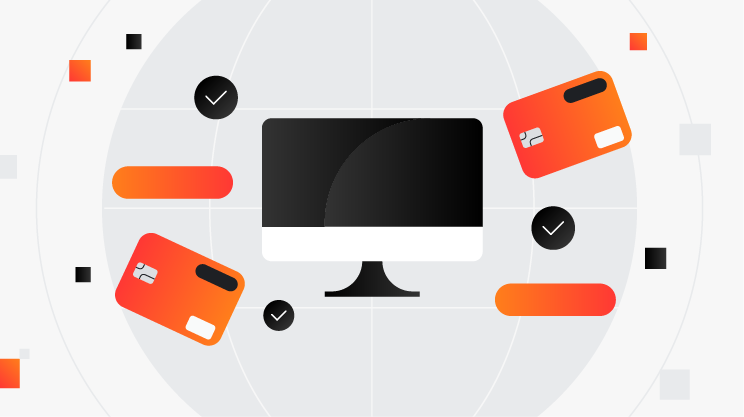What is a payment processor? How does it work, and how to choose one for your business
- •What is a payment processor?
- •How payment processors work
- •Payment gateway vs. payment processor vs. merchant account
- •Tips for choosing a payment processor
- •5 payment processor options for your business
- •Maximise business potential with the right payment processor
- •Frequently asked questions about payment processors
Key takeaways:
Payment processing allows businesses to quickly, easily, and securely accept payments from customers.
An ideal payment processor will accept various payment methods, be easy to set up and use, and offer accounting management features to keep track of pay ins.
Payment processors like Airwallex can help businesses of any size grow globally with added features that help manage cross-border transactions.
The digital payments market in New Zealand is projected to reach US$16.44bn in 2025. This number is set to triple by 2029¹. As the world becomes more and more cashless, investing in a good payment processor for your business becomes more important than ever.
A payment processor can make it quick and easy for businesses to accept digital payments from customers, whether it’s via credit cards or mobile wallets.
Read on to learn more about how payment processing works and get tips on how to choose the right payment processor for your business.
What is a payment processor?
A payment processor is a company that acts as a middleman between a business and the financial institutions involved in a transaction. When a customer makes a purchase using a credit card, debit card, or digital wallet, the payment processor ensures the transaction is authorised, funds are transferred securely, and the payment is completed.
Learn more about how payment processors work below.
How payment processors work
Payment processing facilitates the exchange of payment details between your bank, the customer's payment method, and their bank, ensuring the transaction is authorised and completed smoothly.
Here’s a breakdown of how payment processors process work:
The customer initiates a payment: First, the payment gateway collects the customer's payment details.
Payment is sent for authorisation: The payment gateway encrypts the data and sends it to the payment processor for authorisation.
The customer’s card is verified: The payment processor communicates with the customer’s bank to verify the customer’s card information and determines if there are enough funds to complete the purchase.
The transaction is approved or denied: If the transaction is approved, the bank will respond to the payment processor and the funds will be released into your merchant account. If there are insufficient funds, the payment gateway will decline the purchase.
The transaction is settled: After the transaction is approved, the funds are held in the merchant account, where the funds will be transferred to your business account.
Payment gateway vs. payment processor vs. merchant account
The payment gateway collects payment data from customers, while the payment processor handles the transaction by communicating with the customer’s bank. A merchant account is a type of account that holds the funds temporarily after a transaction is approved. These three components work together to enable businesses to accept payments from customers.
Here’s a comparison of each below:
Payment gateway: The payment gateway securely captures and transmits the customer’s payment information to the payment processor. It’s what you use to accept payments online or via a point-of-sale system, and it helps prevent fraud by encrypting data during the transaction process.
Payment processor: A payment processor transfers payment details between the customer’s bank and yours. It verifies the payment details and authorises the transaction. It also sends the approval or denial back to the payment gateway.
Merchant account: A merchant account is an account that temporarily holds funds from your customer’s payments until they are approved. Once approved, funds are moved to your regular business account.
Knowing how these three work together is necessary for understanding the payment process.
Tips for choosing a payment processor
Finding the right payment processor for your business’ goals is important. Here are some helpful tips to consider when it comes to choosing the right platform:
Costs and fees: Review and compare the different fees associated with your payment processor. Pricing models may include flat fees, percentage-based fees, or bundled pricing. Bundled fees may keep costs predictable, but percentage-based fees may benefit businesses with smaller volumes.
Onboarding time: Consider how easy the platform is to set up and use. Payment API integration methods can significantly impact this process, as some platforms offer simple plug-and-play APIs, while others may require more customisation. A user-friendly API can make accepting payments from your customers much more streamlined and quick.
Payment methods accepted: Ensure your payment processor can accept payment methods in the currencies and markets you currently operate in or are looking to move into. They should be able to accept payments from major card schemes like Visa, Mastercard, and Amex.
Integrations: Integrations make it easy to pair with tools you already use. For example, Airwallex integrates with popular accounting tools like Xero, QuickBooks, and Netsuite so you can consolidate your operations.
5 payment processor options for your business
Payment processors come in many different brands, each tailored to help businesses achieve specific goals. Here are payment processing services to consider:
Airwallex: Airwallex accepts major card networks and 160+ local payment methods and offers like-for-like settlement in 14 currencies.
PayPal: This platform supports many payment methods, including credit and debit cards and PayPal accounts.
Flo2Cash: This payment processor offers services for one-off and recurring payments.
Stripe: Stripe is known for their developer-friendly platform and a flexible full stack of services.
ThryvPay: ThryvPay is designed for service-based businesses and helps their customers accept payments.
Provider | Payment methods | Dynamic, multi-currency pricing | Like-for-like settlement in multiple currencies | eCommerce plugin integrations | Hosted payment page | API integrations with accounting software |
|---|---|---|---|---|---|---|
Airwallex | Major card networks and 160+ local payment methods available | ✔️ | 14 currencies | ✔️ | ✔️ | ✔️ |
PayPal | Not stated | ❌ | ❌ | ✔️ | ✔️ | ✔️ |
Square | Major card networks | ❌ | ❌ | ✔️ | ✔️ | ✔️ |
Stripe | Major card networks and 100+ local payment methods available | ❌ | ✔️ | ✔️ | ✔️ | ✔️ |
ThryvPay | Major card networks | ❌ | ❌ | ✔️ | ✔️ | ✔️ |
1. Airwallex
Airwallex is a payment processor designed to help businesses manage their payments easily. Businesses of all shapes and sizes use Airwallex to receive payments from their global customers.
With Airwallex, businesses can increase their conversions by displaying their pricing in local currency. Our payment solution also gives their customers the option of paying in their local currency using their preferred payment methods. We accept payments in various local payment methods in 180+ countries.
To improve payment acceptance rates, businesses can use Airwallex’s Machine Learning (ML)-powered optimisation engine, 3-Domain Secure (3DS) logic, and local acquiring to enhance security and reduce the risk of fraud, and increase transaction success.
Businesses will also have many options for implementation depending on their team’s resources. Choose from embedding a low-code checkout solution to building fully customisable payment acceptance with our APIs.
The platform is also designed to simplify international payments, allowing users to collect and settle funds across borders efficiently, helping businesses save on conversion costs and streamline their global cash flow.
See how Airwallex’s payment processing stacks up.
2. PayPal
PayPal helps businesses accept online, mobile, and in-person transactions. The platform supports many payment methods, including credit and debit cards and PayPal accounts.2 Like Airwallex, PayPal lets businesses send invoices via QR payment codes and payment links that can be easily shared.
However, if businesses were to withdraw their multi-currency balances from PayPal, they’ll need a corresponding local currency bank account with local bank details to do so. PayPal uses their transaction exchange rate when converting, and this rate may vary.3
3. Flo2Cash
Flo2Cash specialises in providing services for all frequency of payments, one-off or recurring. Flo2Cash offers secure online and in-person credit card payments, invoicing, and integrations with popular eCommerce software.
However, Flo2Cash doesn't support multi-currency acceptance. This could be a deal-breaker for businesses who are looking to expand their reach globally while managing costs.
4. Stripe
Stripe is a payment processor that helps online and brick-and-mortar businesses accept payments from customers and is known for its developer-friendly platform.5 Stripe offers a invoicing, billing, and acceptance of online payments. They also offer over 100 local payment methods and accept major card networks.6
However, businesses who want to streamline their financial operations and consolidate providers will benefit from an all-in-one solution to manage other aspects of their financial operations beyond payment acceptance.
5. ThryvPay
ThryvPay is a payment processing service offered by the Thryv business management platform. ThryvPay is designed for service-based businesses and helps their customers accept payments. It also offers features like invoicing, recurring payments, and customer management tools.7
ThryvPay is ideal for businesses already on the Thryv ecosystem and are looking to streamline their tech stack, but as businesses grow and process more payments, they may require a more robust payment processor to handle a high transaction volume efficiently. Here’s where Airwallex may be a better fit.
Maximise business potential with the right payment processor
The right payment processor can make a huge difference in scaling and growing your business. If you’re a global business, Airwallex can offer a comprehensive solution to power your expansion. With Airwallex, businesses can accept payments through 160+ payment methods in 130+ currencies, helping businesses expand their customer base and revenue potential.
Airwallex’s Payments is designed to work in harmony with our extensive suite of services. Our Business Account lets businesses open multi-currency Global Accounts that allow them to collect and manage funds in multiple currencies, avoiding unnecessary conversion fees and allowing smoother global cash flow.
Frequently asked questions about payment processors
Below are some frequently asked questions related to payment processors.
How long does payment processing take?
The payment process timeline will depend on factors, like the type of payment processor used, what payment method is submitted, and the financial institutions involved.
However, card and mobile wallet payments are usually the quickest. For example, Airwallex processes payments on the same day.
Which payment processor is the best?
The payment processor that's best for your business will depend on your needs and goals. Be sure to compare different payment processors and their costs to see which aligns most.
What fees are associated with payment processors?
Payment processors typically charge several types of fees, including transaction fees, monthly subscription fees, and chargeback fees.
Additional costs may include BECs transfer fees, cross-border fees for international transactions, PCI compliance fees, and hardware fees for payment terminals.
Revolutionise payment experiences.
Sources:
https://www.statista.com/outlook/fmo/digital-payments/new-zealand
https://www.paypal.com/nz/business/accept-payments
https://www.paypal.com/nz/webapps/mpp/merchant-fees
https://flo2cash.com/au/
https://stripe.com/blog/new-zealand
https://stripe.com/guides/payment-methods-guide
https://www.thryv.com/features/thryvpay/
Disclaimer: This information doesn’t take into account your objectives, financial situation, or needs. Airwallex (New Zealand) Limited is registered with the New Zealand Financial Service Provider Register (FSP No. 1001602) to provide a range of financial services in New Zealand.
Share

Vanessa is a business finance writer for Airwallex. With experience working at leading B2B technology companies, Vanessa is passionate about helping Aussie businesses, large and small, grow through cutting-edge tech. In her day-to-day, she breaks down complex tech jargon to help businesses streamline their end-to-end financial operations.
View this article in another region:AustraliaSingaporeUnited KingdomUnited StatesGlobal
Related Posts

eCommerce payment processing: What is it and how does it work?
•12 minutes

Payment Processing: What it is and how it works
•5 minutes

eCommerce payment gateways: What are they and how do they work?
•12 minutes